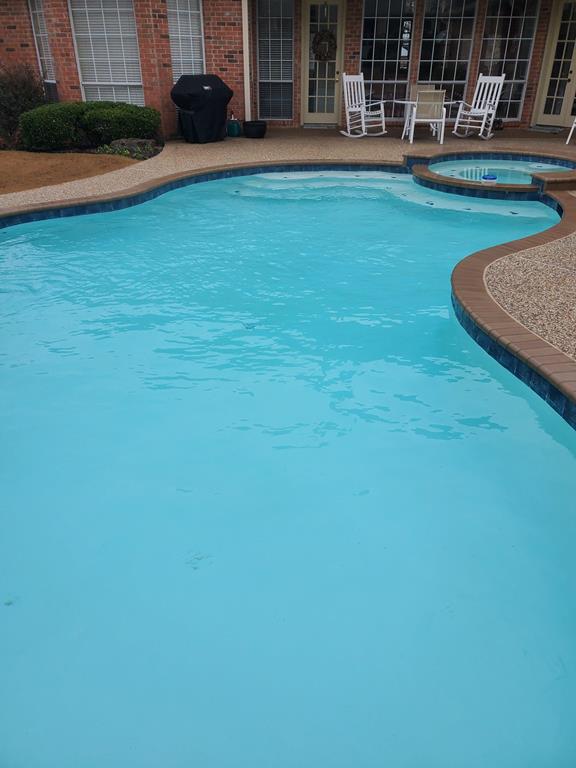
While some N. Texas pool owners choose to close their pools during the winter months, while others people in Frisco and the surrounding area choose to swim all year long. The North Dallas area’s winter temperatures are usually very mild. We average in the high fifties to high sixties from December to March. We also average 205 days of sunshine each year, making using your swimming pool year-round a viable option.
Even after you prepare your pool for the winter, it’s important to take steps to protect it throughout the season. Our team at Executive Blue Pools has some expert tips to help you below.
1. Clearwater Doesn’t Mean Safe Water
Your swimming pool’s water may appear clean and clear, even without maintenance. This occurs because cold weather inhibits the growth of algae and bacteria that would normally make your beautiful pool appear dirty. However, just because the water looks clear doesn’t mean it is properly chlorinated, and it may be unsafe to swim in.
2. Continue to Chlorinate Your Pool in the Winter
To prevent the growth of bacteria in your swimming pool, it is important to keep your chlorine at the proper level. Be sure to test your water throughout the winter months. You may only need to add chlorine a few times per week instead of every day. This can vary based on the weather changes. You can consult your local pool experts at Executive Blue Pools.
Even if you decide to close your swimming pool for the winter, you will need to make sure your pool is properly chlorinated. Continue to check the pool’s levels and to add the appropriate chemicals as needed throughout the winter months. Adjust the chlorine level to between 3 and 5 parts per million (ppm) to prevent bacterial growth and/or algae buildup.
3. Monitor and Balance Your Pool’s pH
It is equally vital to monitor your pool’s pH level. It should be between 7.2 and 7.6, just as it should be the rest of the year. The only changes will be the number of chemicals used and the frequency you add them. The amount and frequency is largely influenced by our North Texas weather and the amount of use your swimming pool gets. You will want to keep the correct pH balance in your swimming pool in order to help prevent corrosion and keep the water healthy to swim in.
4. Monitor Your Pool’s Water Level
Protecting your pool during the winter includes keeping your water at an appropriate level. Even if the temperature is cold outside, water evaporation will still occur, especially if your pool isn’t covered. If the water level drops below the skimmer box and your swimming pool has an automated pumping system, your pump can run dry and burn out without you noticing. The water level in your pool should be halfway up the skimmers or below the overflow grate. If you have questions about your pool’s water level, please call our experts at Executive Blue Pools.
5. Keep Your Pool Covered
To protect your swimming from debris and temperatures below freezing, a quality pool cover is always a good idea. On warm days in North Texas, you can easily uncover your pool. Keeping it covered provides a warm, moist, and dark environment, which allows algae growth to thrive.
It doesn’t take a lot of effort to keep your pool in great shape during the winter, but you will need to take certain precautions to protect it. Neglecting your pool during the winter months can result in algae and bacteria growth, water can freeze in your lines, or other problems. You can save yourself money and frustration by staying on top of basic maintenance. Better yet, have Executive Blue Pools handle maintenance for you, so you don’t have to worry!
Ignoring small damages during winter can lead to significant pool issues requiring expert pool repair services. Addressing these problems early ensures your pool remains in top condition year-round.
If you enjoyed this article, check out these other articles regarding Winter Pool Maintenance:
Using Your Hot Tub This Winter
How to Winterize a Pool in Texas
